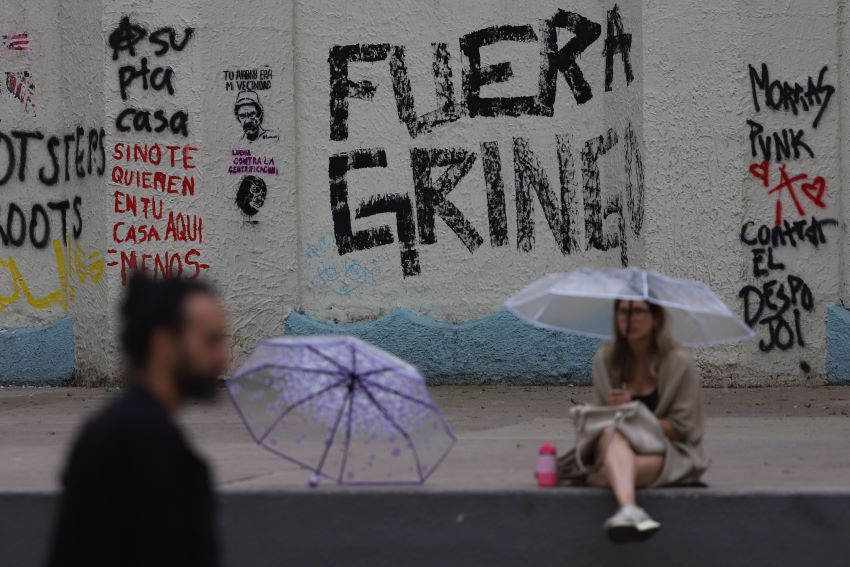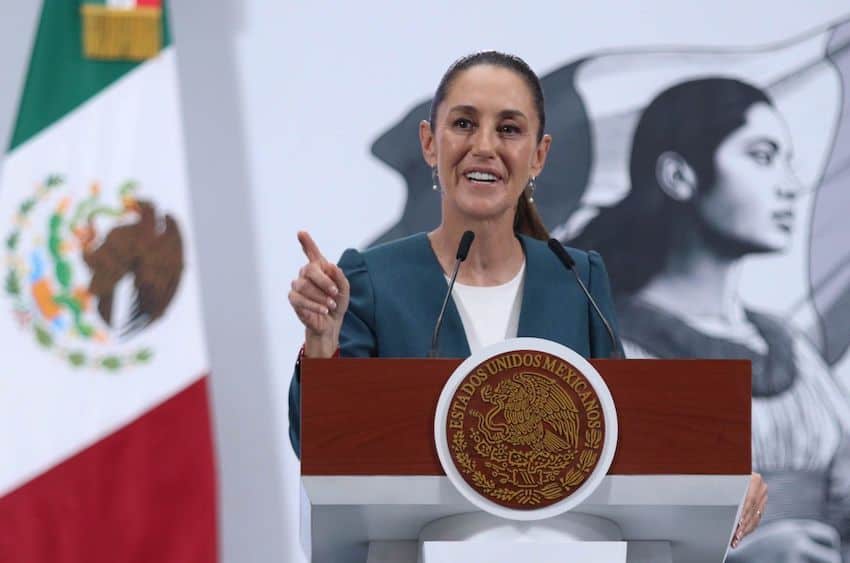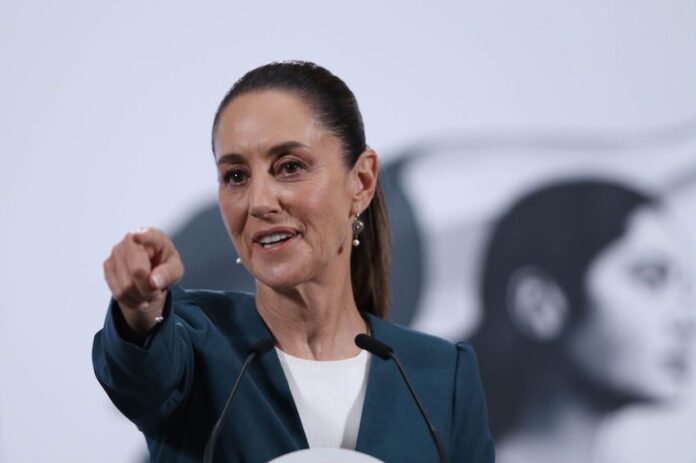President Claudia Sheinbaum spent a good portion of her Wednesday morning press conference speaking about gentrification in Mexico City, a phenomenon that has been particularly noticeable in neighborhoods that are popular with foreign residents of the capital, such as Condesa and Roma.
Late in her press conference, she acknowledged the United States government’s decision to postpone the date U.S. sanctions on the Mexican banks Intercam and CIBanco and the Mexican brokerage firm Vector will take effect.
Sheinbaum: Gentrification ‘is not necessarily associated with foreigners coming to live in Mexico’
Five days after a protest in Mexico City against the gentrification of neighborhoods where many foreigners live and stay, a reporter asked the president about the possibility of enacting national laws against exorbitant cost-of-living increases in such communities.
“First, we need to ask ourselves: what is gentrification?” Sheinbaum responded.
She went on to explain that gentrification refers to the displacement of the “original population” of a particular neighborhood with more affluent people who move into “housing of another economic level.”
Sheinbaum acknowledged that gentrification has taken place in parts of Mexico City and “in many other cities of the world.”

Sheinbaum said that gentrification is “sometimes promoted from within the government,” and subsequently took aim at former Mexico City mayor Miguel Ángel Mancera, who was in office in the capital between 2012 and 2018.
During his mayorship, land was rezoned to allow larger construction projects, she said.
Offering an example, Sheinbaum — a former mayor of Mexico City herself — said that land use permits were changed in some cases to increase the maximum permitted height of a housing project from three stories to 20.
“So, what happens? Well, it’s very profitable for real estate developers who say, ‘Well, I’ll buy this lot’ and housing is built … in [which there is] a lot of stories in the same building,” said the president, who on Monday asserted that gentrification is an issue of “real estate speculation.”
The construction of such housing increases the number of people who move into certain neighborhoods, “expelling the original inhabitants and … raising the standard of living in those places,” Sheinbaum said.
She said that long-term residents of those neighborhoods have every right to ask: “‘Why is this process of gentrification occurring?'”
“… In Condesa, in Mexico City, or in Roma, there have been various issues that have been occurring for many years, some of which weren’t promoted by the government, but which simply occurred as part of the development of the city — a lot of stores and restaurants [opened] that attracted a lot of people to visit the area, not necessarily live there,” Sheinbaum said.
Later, more affluent people moved into the neighborhoods and contributed to an increase in rents, she said, without specifying the period she was referring to.
“Obviously, processes of gentrification shouldn’t occur if they drive out those who are there originally, [forcing them] to go and live on the periphery [of the city],” Sheinbaum said.
“… It changes the standard of living and creates a division between those who have economic resources and those who don’t. Those who have economic resources are left with the best parts of the city,” she said before stating that gentrification is an issue that must be attended to.
In 7 years, immigration authorities issued over 230,000 residency permits in CDMX
Sheinbaum then addressed the issue of the influx of foreigners to neighborhoods such as Condesa and Roma, a number of whom came to live in Mexico City during the pandemic while working remotely, especially for U.S. companies.
“People who come from other places” to live in that part of the city, regardless of whether they come from other parts of Mexico or other countries, “may be part of the process of gentrification,” she said.
“But a process of gentrification is not necessarily associated with foreigners coming to live in Mexico, in this area, that must be made clear,” Sheinbaum said.
Foreigners, especially Americans, were singled out as a central cause of gentrification in Condesa and Roma by many of the protesters who attended the demonstration last Friday.
Among the messages on the placards they held up at the protest were: “Free us from American gentrification”; “You’re visiting paradise, we’re being pushed out”; “You’re not an expat, you’re an invader”; “Foreigners love Mexico, but hate Mexicans;” and “Dispossession comes disguised as Airbnb.”
‘The phenomenon of gentrification must be addressed’
Sheinbaum subsequently shifted her focus to measures that can be taken to prevent the cost of living in Mexico City — and especially the cost of housing — from skyrocketing.
“How is it done? Through different mechanisms and also by building social housing, which is what we’re doing,” she said.
Sheinbaum highlighted that the new homes the government is building are close to centers of employment rather than on the outskirts of cities, “as was done for a long time.”
“The phenomenon of gentrification must be addressed,” she added.
Sheinbaum said that the federal government will “support” Mexico City Mayor Clara Brugada and the mayors of the capital’s 16 boroughs in their efforts to combat gentrification.
“Land use, all that, depends a lot on municipal and state policies, but we’re going to provide support,” she said.
“… In the end what we want is the right to housing and the right to the city, or cities, to be guaranteed. The right to the city is to be able to enjoy all the benefits of a city without being forced out to the periphery,” Sheinbaum said.
She stressed that zoning laws and the issuance of land use permits in Mexico City are a matter for the city government and Congress.
“It’s not a federal matter,” she said.
“How are we attending to the right to housing? With the construction of homes. And we can support all the states and all the municipalities if it is required to guarantee the right to the city and the right to housing,” Sheinbaum said.

Pressed as to whether national legislation would be possible, the president highlighted that the Mexican Constitution attributes certain powers to municipalities.
“So the municipalities are autonomous,” she said.
“It’s one thing to prosecute a crime at the federal level and the state level. It’s another thing to encroach on the powers a municipality has. So, rather, this is where we help, we work in a coordinated manner to guarantee the right to a decent life for people in urban areas,” Sheinbaum said.
Sheinbaum acknowledges postponement of US sanctions on Mexican banks
Toward the end of her press conference, Sheinbaum said “it appears that a postponement has been achieved” regarding the date U.S sanctions on the Mexican banks Intercam and CIBanco and the Mexican brokerage firm Vector will take effect.
The United States Department of the Treasury last month accused the three Mexican financial institutions of laundering millions of dollars for drug cartels. A prohibition on transactions between U.S. banks and the aforementioned Mexican financial institutions was set to take effect in the middle of July, but the Financial Crimes Enforcement Network of the U.S. Department of the Treasury postponed the enforcement date until Sept. 4.
Sheinbaum indicated that the Finance Ministry (SHCP) would comment further, and indeed it released a statement later in the day.
“The United States Department of the Treasury, through its Financial Crimes Enforcement Network (FinCEN), announced today a 45-day extension, until September 4, 2025, for the entry into force of orders that restrict certain fund transfers with three Mexican financial institutions: CIBanco, Intercam Banco and Vector Casa de Bolsa,” the SHCP said.
The ministry said that the decision was “the result of dialogue and collaboration between the Government of Mexico and U.S. financial authorities.”
The SHCP noted that the Mexican government “has assumed the temporary management” of Intercam, CIBanco and Vector, “with the aim of strengthening supervision, ensuring regulatory compliance, and preventing harm to users of the financial system.”
By Mexico News Daily chief staff writer Peter Davies (peter.davies@mexiconewsdaily.com)
